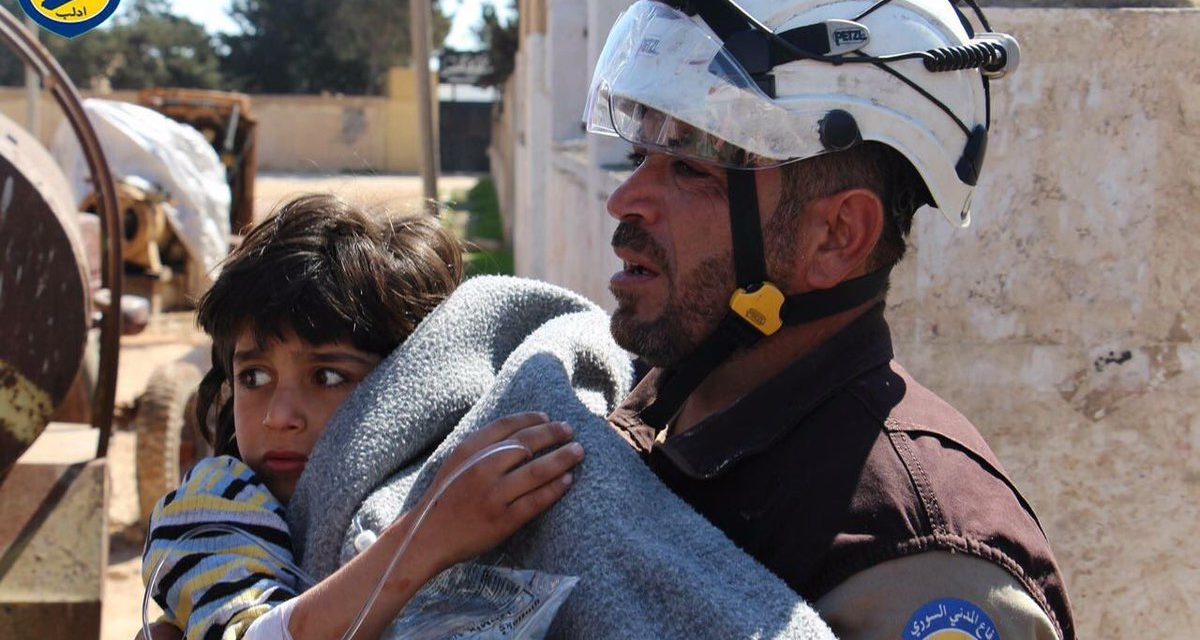A White Helmet rescuer trying to escape Syria: “Our fate is worse than that of army defectors”
Last weekend 98 White Helmets rescuers and 324 family members were evacuated from southern Syria to escape possible Assad regime retribution. A multi-national operation took them via Israel to Jordan, from where they will go to Canada, Germany, and the UK.
But about 400 White Helmets and relatives could not be moved because of obstruction by pro-Assad forces and the Islamic State. And some never even made it to a list for departure.
White Helmets co-founder James Le Mesurier says about 3000 volunteers remain in Syria. Some are in opposition territory in northern Syria. Others are now trapped in regime-occupied areas, at risk of detention or worse: Bashar al-Assad threatened this week to kill them.
See Syria Daily, July 27: Assad Calls for Killing of White Helmets
“Skin Falling Off Their Flesh”: A White Helmets Rescuer Recalls His Detention
Khalil Ashawi writes for Reuters:
Fearing for his life, Daman Ayed registered to be evacuated from Syria along with hundreds of other members of the White Helmets rescue service, hoping for a new life in Canada.
But the 20-year-old was not among the several hundred people who were spirited out of the country last weekend over the Israeli-occupied Golan Heights and into Jordan. When the list of names approved for evacuation arrived, his was not on it.
“They told us at midnight that the names had come. We were surprised how many names had not been approved,” said Ayed. Only two of the people working at his rescue center were on the list.
Instead, he joined thousands of other people boarding buses for opposition territory in northwest Syria under the terms of the rebels’ surrender to the government.
Many of the rescue workers and their families originally supposed to join the evacuation were not able to reach the frontier because of fighting, the White Helmets said.
Of about 800 people, including about 250 White Helmets, along with 550 family members, in the plans, only about 100 rescue workers and about 300 relatives were able to cross through the Golan Heights and Jordan.
However, other White Helmets, including Ayed, were never cleared for evacuation. “We sent these lists…and some names were refused and some names were accepted,” said Ammar al-Selmo, a White Helmet working at the group’s headquarters in Turkey.
Britain, Canada, and Germany were among the countries that offered resettlement and helped to arrange the evacuation.
Asked why some White Helmets were not included in the evacuation plans, a British Foreign Ministry spokesperson said: “This was a response to a specific and urgent situation”.
“We have worked, alongside our partners, to use our diplomatic channels to evacuate the maximum number of White Helmets and their families as was possible in an extremely constrained security context.”
German officials declined to comment.
“Only Solution to Save Our Lives”
Ayed, who has arrived in the northwest along with his parents and younger brother, said he still sees leaving Syria as his best hope of surviving the war.
“Regarding our departure for Canada, I consider it the only solution to save our lives,” he said.
The northwest is the last major area still held by rebels. Idlib faces frequent bombardment and President Bashar al-Assad has said it is now his target.
Rescue workers with the White Helmets, which operates only in opposition-held parts of Syria, are at great risk if captured by the government, Ayed said.
“Our fate is worse than that of army defectors,” he said.
Assad has accused the White Helmets of being an al Qaeda front, and his government says they fabricated chemical weapons attacks as a pretext for Western air strikes.
The group, which receives funding from Western governments, says it is a civilian rescue organization that works under bombardment to pull people from the rubble.
Adding to his fear of capture by Assad’s forces, Ayed said when the army advanced into his district of the southwest this month, it seized paperwork at the White Helmets base.
“The most important thing is the names and identities of the volunteers, and our special identification cards. This is what damages us the most. The papers and the names were not destroyed, but stayed as they were and are in the hands of the regime,” he said.
Fate Unknown
Assad has crushed one center of the rebellion after another in recent years and last month turned to the opposition stronghold straddling Deraa and Quneitra provinces in the southwest.
Airstrikes were followed by ground attacks and offers of surrender in return for safe passage to northwestern Syria for any who refused to come back under government control.
Ayed, who said he has been a White Helmet for 16 months, was based in Lajat, the first rebel area in Deraa to come under attack.
As the army closed in, it shelled the White Helmets center and the rescue workers fled before it was captured, he said. Its 30 staff split up, heading for different parts of the remaining rebel territory.
Some sought refuge in towns that were later captured by the government. “They were surrounded and their fate is unknown,” he said.
Ayed and his family ended up in Quneitra, near the frontier with the Golan Heights, the last patch of rebel ground in southwest Syria to surrender to the government.
He worked at the White Helmets center there for several weeks. Then one evening all its rescue workers were called in for an urgent meeting.
They were told to submit their names for evacuation through Israel and Jordan with the prospect of resettlement in Canada, he said. When the names came back, Ayed was not among them.

